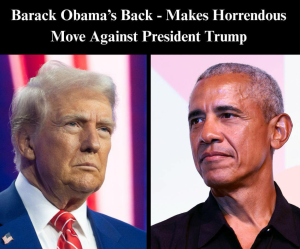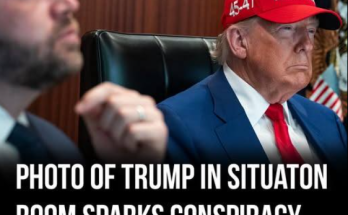Barack Obama Calls for Government Limits on Online Speech — Seniors Are Right to Be Concerned
In a move stirring deep controversy and raising serious concerns about freedom of expression, former President Barack Obama recently advocated for increased government regulation of online speech, citing the rise of misinformation and the threats it poses to democracy. While his intentions may be rooted in safeguarding the public, many — especially seniors and free speech advocates — are sounding the alarm, worried that such proposals could lead to censorship, overreach, and the silencing of dissenting voices.
Obama’s Call for Government Involvement
During a recent speech at a public policy summit, Barack Obama warned that “the design of today’s digital platforms is tilting our attention in ways that are exploiting our emotions, amplifying misinformation, and eroding the very foundation of truth.” He argued that social media companies have too much unchecked power and that governments must step in to ensure accuracy, accountability, and safety.
In plain terms, he is suggesting that certain types of speech be filtered, flagged, or possibly removed from online platforms if they are deemed misleading or harmful. While he emphasized that the goal is not to suppress debate, he urged the creation of legal frameworks that can penalize or block content spreading “falsehoods” or inciting division.
The Core Concern: Who Decides What’s True?
The heart of the backlash, especially among older Americans, lies in one haunting question: Who gets to define what is misinformation?
This is not a trivial concern. History has shown time and again that government power, when left unchecked, can quickly become a tool for political bias. What is deemed “false” or “dangerous” by one administration might be perfectly legitimate dissent in the eyes of another.
Seniors, many of whom have lived through political shifts, censorship scandals, and government abuse of power in decades past, are understandably cautious. They know that limiting speech, even with good intentions, can lead down a slippery slope — one where only approved narratives are allowed to be heard.
A Deepening Divide in the Digital Age
Obama’s remarks come at a time when trust in both the media and government is near historic lows. For many Americans, the internet — particularly social media and independent platforms — is where they find alternative perspectives, uncensored news, and open dialogue. The suggestion of tightening control over these spaces is, to them, not a solution, but a threat.
This is especially true for conservative-leaning seniors, who have watched traditional media outlets become increasingly partisan and who feel that their views are already being pushed to the margins online. For them, Obama’s proposal feels less like protection and more like a justification for silencing opposition voices under the banner of safety.
The Power of Big Tech and Government Alliances
One of the reasons Obama’s call has drawn so much fire is the growing cozy relationship between Big Tech and government institutions. Platforms like Facebook, YouTube, and X (formerly Twitter) have already been accused of shadow banning, algorithmic bias, and suppressing stories that do not align with certain political views.
If government regulation is added to the mix, critics fear this could institutionalize censorship, creating a legal framework for removing speech that questions authority, challenges mainstream narratives, or simply asks uncomfortable questions.
The danger isn’t just in silencing harmful actors; it’s in accidentally — or deliberately — silencing the truth.
Seniors: The First to Notice, and the First at Risk
Seniors often rely on social media and online news to stay informed, especially those who are isolated or living in rural areas. They’ve seen how narratives can shift overnight — what was once labeled “misinformation” during the pandemic, for example, was later acknowledged as plausible or even accurate.
This pattern has led many seniors to question the motivations behind content moderation. They are often more skeptical of top-down control and understand how crucial the free flow of information is in a functioning democracy. They remember the days when books were banned, reporters were jailed, and public discourse was tightly policed — and they don’t want to return to that.
They also recognize that the moment the government starts policing speech, it creates a chilling effect. People may begin to self-censor out of fear that their thoughts — even when honest — might be flagged or punished. That’s not a healthy or free society.
A More Balanced Approach Is Needed
To be fair, Obama’s concerns are not baseless. The rise of deepfakes, conspiracy theories, and targeted disinformation campaigns — especially by foreign actors — is real. These threats do have consequences, from public health confusion to election interference.
But the solution cannot be simply giving the government power to police online speech. Instead, what’s needed is:
-
Greater transparency from tech platforms about how content is moderated
-
Digital literacy programs to help users, especially seniors, distinguish reliable sources from questionable ones
-
Stronger protections for whistleblowers and independent journalists
-
Open forums for dialogue rather than suppression of ideas
Free societies depend on messy, sometimes uncomfortable debates. But truth is best found through open conversation, not state control.
Final Thoughts
Barack Obama’s suggestion to involve the government in online speech regulation might come from a place of concern, but it opens up dangerous possibilities. Once speech becomes a regulated commodity, it ceases to be free.
Seniors — many of whom have lived through the Cold War, Watergate, and countless media revolutions — are sounding the alarm because they know what’s at stake. They’re not being paranoid. They’re being vigilant.
We must all tread carefully here. While the digital age presents new challenges, the solution cannot come at the cost of our most basic freedoms. Online or offline, the right to speak — and to listen — must remain sacred.
